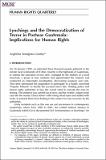| dc.description.abstract |
This study argues that certain forms of massive violence cause a type of social trauma that is more than the sum of the individual traumas suffered, ie uniquely sociological effects of state terror, which affect not only individuals but the social spaces they inhabit: their institutions, their customs, their ways of interacting with one another. This article suggests that the Guatemalan lynchings are a manifestation of precisely this kind of sociological trauma and examines the process by which state violence ruptured and replaced the preexisting institutions of civil society in Guatemalan communities and the ways in which this process has led to lynchings in the postwar period. |

